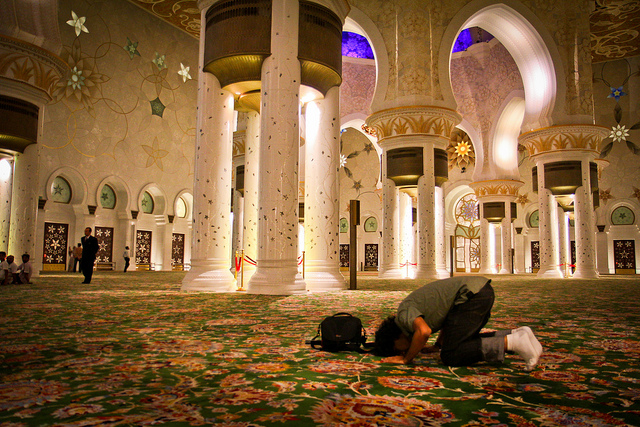
When one thinks of conflict in the Middle East, religious factors are probably among the first that come to mind. But, nowadays, competing strategic interests and imperial ambitions play a much larger role than religious or sectarian cleavages in defining regional politics. This is potentially a positive development.
Consider the struggle for regional influence between Saudi Arabia and Iran. Despite having long been viewed as a result of the Sunni-Shia divide, the competition is really between two opposing political systems: Iran’s revolutionary regime, bent on changing the regional balance of power, versus Saudi Arabia’s conservative monarchy, which seeks to uphold the old regional order.
In this context, Iran’s support of the Arab Spring uprisings makes sense. In an Arab-dominated Middle East, non-Arab Iran is the natural enemy; but in a Muslim Middle East, the Islamic Republic of Iran is a potential hegemon. So Iran was quick to back free elections, predicting that voters would bring Islamists to power.
The ultra-conservative House of Saud, by contrast, abhors such political upheaval and naturally views Arab democracy as a fundamental threat. So, while maintaining its close alliance with the United States, the Western imperial power that Iran fears most, Saudi Arabia opposed the uprisings, whether the protagonists were Shia (as in Bahrain), or Sunni (as in Egypt). In this sense, the Arab Spring was a story of the growth and suppression of political Islam.
Moreover, alliances no longer fit within Sunni-Shia borders, further underscoring the primacy of politics, rather than religion, in fuelling regional conflicts. For example, Hamas, the Sunni fundamentalist group that rules the Gaza Strip, has survived largely as a result of financing from Iran.
Similarly, Oman, dominated by Ibhadis and Sunnis, has a closer relationship with Iran, with which it shares control of the vital oil-shipping lanes in the Strait of Hormuz, than it does with Saudi Arabia. In fact, Oman is now being accused of helping Iran to smuggle weapons to the Houthi rebels in Yemen, where Iran and Saudi Arabia are fighting a proxy war.
Likewise, Qatar maintains a relationship with Iran, with which it shares colossal gas fields, that is too close for Saudi Arabia’s comfort. Last year, the Saudis led a coalition of Arab countries—including the United Arab Emirates, Egypt, and Bahrain—in isolating Qatar diplomatically and imposing sanctions.
And yet Turkey, another Sunni power, maintains a military base in Qatar. And this is not the only source of tension between Saudi Arabia and Turkey; they also disagree about the Muslim Brotherhood. Whereas the Saudis view the Brotherhood as an existential threat, Turkey considers it a model of Islamist politics worth defending and a means of expanding Turkish influence in the Arab world.
But Turkey’s support for the Muslim Brotherhood has put it at odds with yet another Sunni power: Egypt. Indeed, the Brotherhood is Egyptian President Abdel Fattah el-Sisi’s nemesis. Together with its regional ambitions and efforts to position itself as the main champion of the Palestinian cause, Turkey appears to be directly challenging Egypt’s vital interests.
Perhaps the best illustration of how security and strategic concerns have superseded religious conflict is the shift in relations between Arab Sunni states—including the Gulf monarchies and Egypt—and Israel. The economic and military achievements of Israel, once the Arab world’s ultimate enemy and infidel, were long viewed as a measure of Arab failure—a source of endemic hatred alloyed with grudging admiration.
Yet, today, as Iran’s influence grows and Islamist terrorism continues to proliferate, Palestine is the last of Saudi Arabia’s worries. So fundamental are the changes to the Kingdom’s strategic interests that, despite being the custodian of Islam’s holiest sites, it said nothing when US President Donald Trump recognised Jerusalem as Israel’s ‘eternal capital’. Other Sunni Gulf monarchies, as well as Egypt, have gone further, engaging in security cooperation with Israel.
Politics is also superseding religion within Israel. Prime Minister Benjamin Netanyahu’s expansionist drive in the West Bank is about political power, not Judaism. After all, the creation of a majority-Palestinian bi-national state would mean severely diluting the country’s ‘Jewishness’.
In fact, to maintain its grip on the occupied territories, Israel’s religious-nationalist coalition has sold its soul to Christian anti-Semites: American evangelists. Netanyahu’s alliance with this group—ardent supporters of the colonisation of Judea and Samaria—is an affront to both the overwhelmingly liberal Jewish-American community and the powerful rabbinical establishment in Israel.
A final example of a Middle Eastern country choosing politics over religion is Iraq. Muqtada al-Sadr, the fiery Shia cleric who previously led deadly attacks against US troops, is now emerging as America’s best hope of containing Iran’s expanding influence in Iraq.
The head of an unlikely alliance of reformist Islamists, secular civil-society groups and Iraq’s communist party, Sadr won the recent parliamentary election by promising a nationalist drive to oust Iran from Iraq. Earlier this year, Sadr visited the fiercely anti-Iranian crown princes in Saudi Arabia and the UAE, and is now the key obstacle between Iran and the strategic depth it seeks in Iraq.
Today’s chaos in the Middle East is rooted largely in historical legacies—arbitrarily drawn borders being a major one—and a lack of visionary leadership. But religious and sectarian divisions haven’t helped, either. While the situation undoubtedly remains tense and unwieldy, religion’s waning political role may create an opening for progress, much as, say, Saudi Crown Prince Muhammed bin Salman’s willingness to discard fundamentalist imperatives favours modernisation. After all, strategic and security interests are always more amenable than religious conviction to reason and diplomacy.

